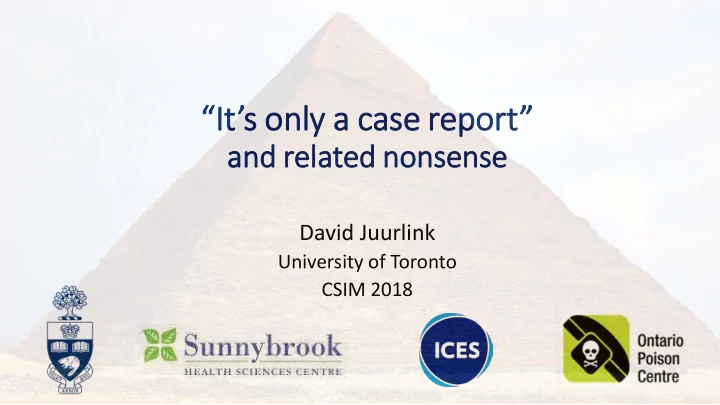

“It “It’s only a ly a case e rep eport” ” and nd related ed n nonsen ense David Juurlink University of Toronto CSIM 2018
Oblig igatory D Disclosure S e Slide Personal income Clinical billings Salary support UofT, Sunnybrook DOM, ICES, Ontario Poison Centre The Medical Letter Medicolegal
Oblig igatory D Disclosure S e Slide Personal income Clinical billings Salary support UofT, Sunnybrook DOM, ICES, Ontario Poison Centre The Medical Letter Medicolegal No dealings with industry
Stronger evidence More believable “Only way to show cause-effect”
Weaker evidence Bias / confounding “Can’t prove cause-effect”
“That’s nice.”
We’ e’re t e trying to to a answer er ques estions Effects of interventions Prognosis Role of agents (or characteristics) in health and disease
“Evidence-based medicine is the conscientious, explicit and judicious use of current best evidence in making decisions about the care of individual patients.”
RCTs Ts Intervention No intervention
RCTs Ts Randomized (!) Cost / duration Conceptually simple May be impossible Tailored May be unethical Measures of effect Selected patients Relative Quasi-ideal setting Absolute
“Drugs a are t tested by the people w who m manufacture t them... on hopele lessly ly s small l numbers of weir ird, u unrepresentativ ive p patie ients... i in such a a way y that at t they ey e exagger erate t e the benefits of trea eatmen ents. Unsurpris isin ingly gly, these t trials ls t tend to produce r results t that f favour t the manufacturer. When t trials ls y yield ld result lts t that c companie ies don’t l like, they ey are e perfec ectly y entitled t to hide e them... s so we o only ev ever er s see e a distorted p picture e of any d drug’s t true ef e effec ects.” - Ben Goldacre, Bad Pharm a
“Always note and record the unusual. Publish it. Place it on permanent record as a short, concise note. Such communications are always of value.”
“But remember: It’s only a case report so it probably won’t get published anywhere good.”
Sirianni Ann Emerg Med 2008
Sirianni Ann Emerg Med 2008
Sirianni Ann Emerg Med 2008
Sirianni Ann Emerg Med 2008
McLaughlin Annals of EM 2000
Cross s section ional s l studie ies POPULATION With attribute Without attribute
RALES
RALES
RALES
RALES
RALES
RALES
RALES
RALES
RALES
What RALES said vs. What we heard
Epilogu gue RALES NEJM 2500 1999 2004 2000 Spironolactone 1500 + ACEI (> 66 y with CHF) 1000 500 0
5-fold ld ↑ stro rong opioids ids CMAJ 2009
Opioid deaths, Ontario 1991 - 2015
% of all deaths involving an opioid 2000 0-14 15-24 25-34 45-54 55-64 35-44 65+
% of all deaths involving an opioid 2005 2000 0-14 15-24 25-34 45-54 55-64 35-44 65+
% of all 2010 deaths involving an opioid 2005 2000 0-14 15-24 25-34 45-54 55-64 35-44 65+
2015 % of all 2010 deaths involving an opioid 2005 2000 0-14 15-24 25-34 45-54 55-64 35-44 65+
Case se-con ontrol s ol studie ies Cases Exposure Controls
Case se-con ontrol s ol studie ies Cases Exposure Controls
Case se-con ontrol s ol studie ies Cases Exposure Controls
Case se-con ontrol s ol studie ies Can’t estimate incidence Rare diseases Biases Long latency - Subject identification Fast, inexpensive - Exposure assessment Multiple exposures Confounding Few ethical issues - “Association ≠ causation”
Gatifloxacin Ciprofloxacin
51 mM 81 mM Happe Ann Int Med 2004
~200,000 women ≥66 years initiating a a bispho phospho honate 716 ‘at atypic ical’ l’ f frac acture; 3 3580 c controls ls
“Typ ypic ical” l” f frac actures N=9723 723
Cohort s studies es OUTCOME +++ +
Cohort s studies es Can n establi lish i h incid idenc ence Inefficien ient Clinic nically lly l logical l Expen pensiv ive e Expo posur ure n e not b biased ed by by outcome Dela layed ed finding dings Can n study udy m mult ltiple o iple outcomes es Biase ses s
Estimati ting i g inciden ence e
7 per 100,000 p-y N=65,784 278 per 100,000 p-y adjusted HR ~42 JAMA Psych 2015
Pred edictors o of suicide Recurrent poisoning aHR 2.85 Male aHR 1.87 Saw a psychiatrist aHR 1.65 Advancing age Finkelstein JAMA Psych 2015
Best way to evaluate causality / determine if an intervention can work
Best way to evaluate causality / determine if an intervention can work Real-world insights not obtainable any other way
Best way to evaluate causality / determine if an intervention can work Real-world insights not obtainable any other way Sometimes awesome
“That thing I said about case reports? Still solid 120 years later.”
Self-matched designs Subject is his or her own control Example: The case-crossover design Identify event (case) Look back for exposure at different intervals CONTROL RISK Interval Interval
Macrolide-CCB interaction Hospitalized with hypotension CCB therapy 7-day risk 7-day control 21-day “ washout ” interval interval interval Erythromycin OR 5.8 (2.3 to 15.0) Clarithromycin OR 3.7 (2.3 to 6.1) Azithromycin OR 1.5 (0.8 to 2.8)
Hi High gh-dos ose i insulin lin i in verapam amil il pois ison onin ing LV Efficiency LD 100 Kline et al. Cardiovasc Res 1997
Recommend
More recommend